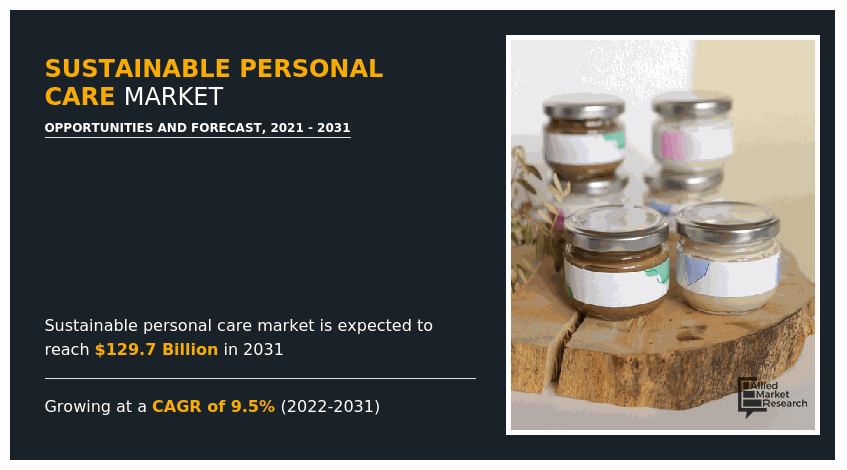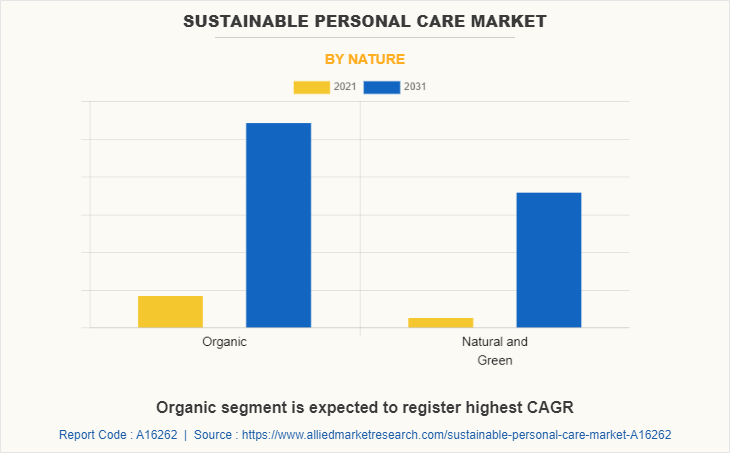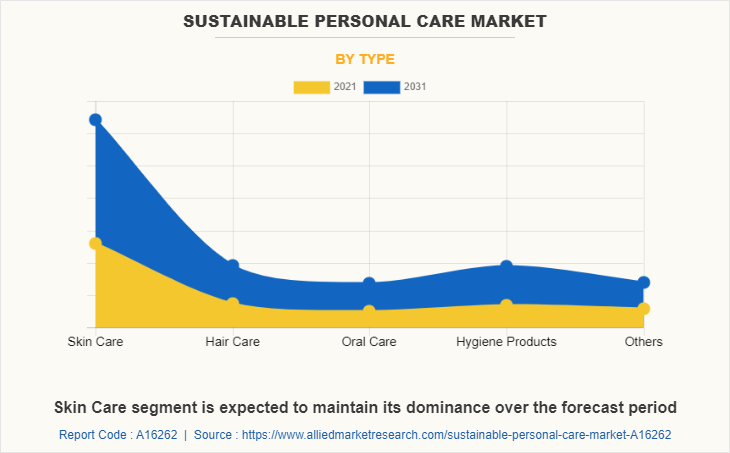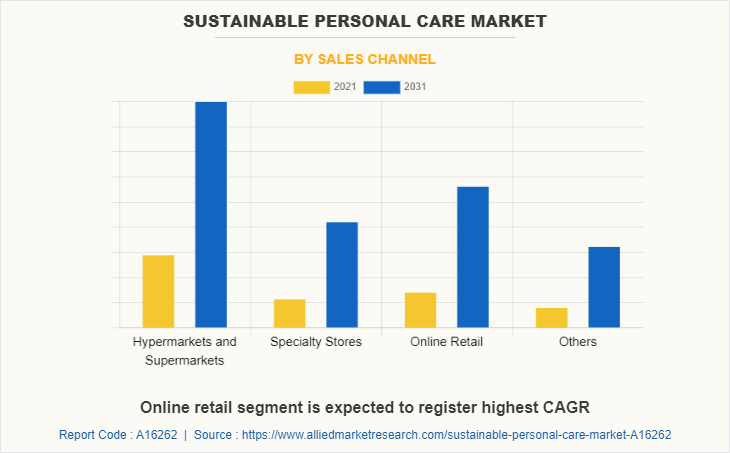Sustainable Personal Care Market Research, 2031
The global sustainable personal care market was valued at $50.8 billion in 2021, and is projected to reach $129.7 billion by 2031, growing at a CAGR of 9.5% from 2022 to 2031.
Sustainability in the personal care business has evolved from a fad to a necessity. Sustainability is increasingly considered in the procurement of raw materials, product formulations, manufacturing methods, packaging, distribution, and marketing, as well as product end-of-life concerns. A crucial reason behind this is the rise in customer desire for ethical products.

The sustainable personal care market is segmented into Nature, Type and Sales Channel.
Manufacturers are encouraged to produce new products as investments in product research and development have increased, as has the expanding trend of herbal ingredient-based products. Refresh Botanical, for example, expanded its market reach to India in April 2021, by offering a product line developed for sensitive, aged, and acne-prone skin types. Facial cleansers, toners, moisturizers, eye and face makeup remover, intensive serum, night restore the complex, and premium eye serum are all expected to be a part of the collection. These products will also be available for purchase in brick-and-mortar stores, retail shopping malls in key Indian cities, and e-commerce sites like Amazon, Flipkart, Nykaa, and Smytten.Sustainable The sustainable personal care market size has grown in recent years as a result of these factors.
Overall, the sustainable personal care industry has demonstrated that it is more robust than other personal care products and that the wellness narrative has an impact on specific categories. From 2021 onward, beauty and personal care e-commerce and digitalization are expected to be at the forefront of competition as companies battle for consumers' increased digital attention and aim to offer a favorable consumer experience, both online and offline.
The COVID-19 pandemic has shifted consumer attention to online businesses at an unprecedented rate. As a result of these current developments, big businesses in the industry are investing to offer a unique digital experience for their customers. For example, award-winning filmmaker, actor, and activist Olivia Wilde took part in an online campaign in October 2021, on the fifth anniversary of her relationship with eco-luxury organic skincare company, True Botanicals. The surprising contradiction of safe, ecological skincare, and the value of natural ingredients was highlighted in this commercial.
The sustainable personal care market is segmented on the basis of nature, type, sales channel, and region. On the basis of nature, the market is categorized into organic and natural/green. By type, it is segregated into skin care, hair care, oral care, hygiene products, and others. Depending on sales channel, it is fragmented into hypermarkets/supermarkets, specialty stores, online retail, and others. Region-wise, it is analyzed across North America (the U.S., Canada, and Mexico), Europe (Germany, France, UK, Italy, Spain, the Netherlands, and the rest of Europe), Asia-Pacific (China, Japan, Australia, South Korea, India, and Rest of Asia-Pacific), and LAMEA (Brazil, Argentina, Egypt, South Africa, United Arab Emirates, and Rest of LAMEA).

On the basis of nature, the organic segment was valued at $ 28,323.2 million in 2021 and is expected to reach $74,058.5 million by 2031 at a CAGR of 9.8%. This is majorly attributed to the increasing demand for pesticide-free, clean label, and natural products from the consumer. Organic sustainable personal care product is made from plant ingredients that have been grown in soil that is free of pesticides, fungicides, herbicides, and synthetic fertilizers, as well as containing no genetically modified organisms (GMOs). These factors are likely to favor the sustainable personal care market growth through the organic segment during the forecast period.

By type, the skin care segment is expected to grow at a CAGR of 9.2% during the forecast period. Skin care products play a crucial role in human behavior. Every individual wants to look attractive by maintaining healthy and glowing skin. Skin care products, such as serums, moisturizers, exfoliators, body lotions, and eye creams help in maintaining healthy and glowing skin. Besides, sustainable skin care products are made by using natural and organic ingredients having minimum or no side effects on human health or the environment, which is expected to boost the growth for sustainable personal care market forecast period over 2022-2031

On the basis of sales channels, the online retail segment was valued at $ 11,984.6 million in 2021 and is expected to reach $ 32,941.4 million by 2031 at a CAGR of 10.3%. An increase in the adoption of e-commerce portals in developing regions and a rise in the number of offers or discounts provided by these sites attract end users, including home consumers and institutions to purchase sustainable personal care through e-commerce platforms. Furthermore, e-commerce platforms have expanded customer reach, resulting in it becoming a major source of revenue for many businesses. Moreover, due to the rapid increase of internet-enabled mobile user bases in emerging nations, the e-commerce sector is likely to expand in the future.

North America dominated the global sustainable personal care market share and is projected to continue this trend during the forecast period. This is majorly attributed to widespread knowledge of sustainable ingredients and products in the region. The demand for sustainable personal care is increasing in the U.S. and Canada, which boosts the regional market growth. However, Asia-Pacific is predicted to have the most promising growth rate, owing to the rapid development of the health & wellness as well as the personal care industries in the region.
Key players in the global market have adopted a variety of development methods to grow their market share, boost their profitability, and stay competitive. The key players profiled in this report include, Coty Inc., Colgate Palmolive Company, Estee Lauder Companies Inc., Johnson & Johnson, Kao Corporation, L’Oréal S.A., L'Occitane Group, The Procter & Gamble Company, Unilever Plc, and Weleda.
Key Benefits For Stakeholders
- This report provides a quantitative analysis of the market segments, current trends, estimations, and dynamics of the sustainable personal care market analysis from 2021 to 2031 to identify the prevailing sustainable personal care market opportunities.
- The market research is offered along with information related to key drivers, restraints, and opportunities.
- Porter's five forces analysis highlights the potency of buyers and suppliers to enable stakeholders make profit-oriented business decisions and strengthen their supplier-buyer network.
- In-depth analysis of the sustainable personal care market segmentation assists to determine the prevailing market opportunities.
- Major countries in each region are mapped according to their revenue contribution to the global market.
- Market player positioning facilitates benchmarking and provides a clear understanding of the present position of the market players.
- The report includes the analysis of the regional as well as global sustainable personal care market trends, key players, market segments, application areas, and market growth strategies.
Sustainable Personal Care Market Report Highlights
| Aspects | Details |
| By Nature |
|
| By Type |
|
| By Sales Channel |
|
| By Region |
|
| Key Market Players | weleda uk, Unilever plc, Johnson & Johnson, L’Oréal S.A., L'Occitane Group, Coty Inc., Estee Lauder Companies Inc., Kao Corporation, The Procter & Gamble Company, Colgate Palmolive Company |
Analyst Review
Consumers’ awareness of health and wellness continues to increase, forcing manufacturers to focus on continuous product innovation with new ingredients and additional health benefits to gain considerable market share. The increase in use of sustainable ingredients in hair care, skin care, oral care, and hygiene products boosts the demand for sustainable personal care products. Sustainable personal care products’ manufacturers also focus on producing high-quality natural products with health-beneficial properties.
In 2021, the market was hugely recovering from the COVID-19 impact along with increase in awareness about health wellness, which boosts the market in terms of value. The same trend is considered for the estimated the year of 2022, the market is expected to be in the recovery stage in 2023, and is expected to maintain a significant CAGR during the forecast period.
North America is dominating the global sustainable personal care market due to the high spending power of consumers on high-quality sustainable personal care products in countries, such as the U.S. and Canada. Europe is one of the leading regions in the market due to high awareness among consumers about ingredients and sustainable personal care products. Asia-Pacific is expected to exhibit the fastest growth during the forecast period. This is attributable to the rise in number of working women in countries, such as China and India and their growing interest and spending capacity for sustainable beauty and personal care products. Moreover, the rise in young population in these countries with access to the internet is expected to offer immense opportunities for the growth of the regional market during the forecast period. LAMEA is expected to register a considerable growth rate during the forecast period owing to the increasing spending power of consumers and rise in awareness about personal care products among consumers in the region.
Overall, the market is expected to register a significant growth rate during the forecast period owing to increase in demand for organic and natural ingredients and products, environmental concerns, and renewable sources.
The sustainable personal care market was valued 50,791.8 in 2021.
The market is estimated to be value $ 57,191.6 million in 2022
The forecast period of sustainable personal care market is 2022-2031
Kao Corporation, L’Oréal S.A., L'Occitane Group, The Procter & Gamble Company, Unilever Plc are holding the largest share in the sustainable personal care market.
India, China, South Korea, and South Africa are lucrative markets for sustainable personal care, growing at a CAGR of 11.2%, 10.7%, 9.5%, and 9.2%, respectively, during the forecast period.
in 2021, North America dominated the global sustainable personal care market with the share of 33.3% and is projected to continue this trend during the forecast period.
Growing adoption of sustainable products, Increasing demand for natural and organic ingredients, and rising environmental concerns are the few trends in the sustainable personal care market
Young and millennial population are the largest end users of the sustainable personal care market
Loading Table Of Content...



